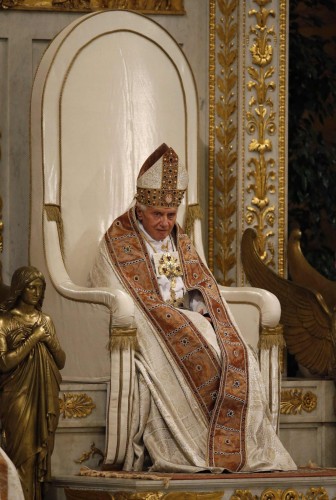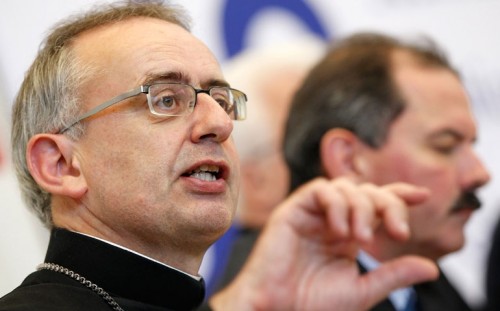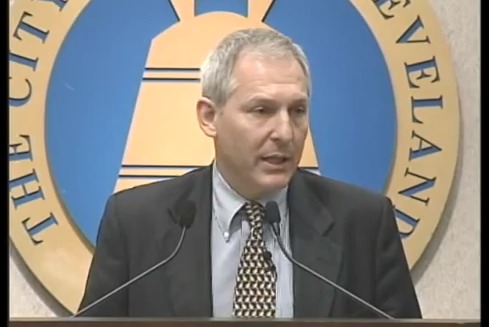File under: We Don’t need no stinkin’ discussion on the topics.
by Lisa Wangsness
Cardinal Sean P. O’Malley is banning an Austrian priest from speaking at a Catholic parish in Dedham because the priest advocates ordaining women and making celibacy optional, stances that place him in opposition to church teachings.
 The Rev. Helmut Schuller was invited to speak at St. Susanna Parish July 17 as part of a 15-city tour of the United States called “The Catholic Tipping Point: Conversations with Helmut Schuller,” sponsored by a coalition of reform-minded Catholic organizations, including Voice of the Faithful, based in Needham.
The Rev. Helmut Schuller was invited to speak at St. Susanna Parish July 17 as part of a 15-city tour of the United States called “The Catholic Tipping Point: Conversations with Helmut Schuller,” sponsored by a coalition of reform-minded Catholic organizations, including Voice of the Faithful, based in Needham.
But O’Malley has declared he will not allow anyone to speak on church property who advocates beliefs in conflict with church doctrine.
As a result, the coalition that invited Schuller has moved its event to a nearby Unitarian Universalist church.
Schuller is the founder of the Austrian Priests’ Initiative, which advocates allowing women and married people to become priests and greater lay participation as ways of addressing a priest shortage. About 1 in 10 Austrian priests are members, the Austrian Independent newspaper reported; priests’ groups have sprung up in several countries, including Ireland and the United States, and Schuller has said he hopes the movement will spread worldwide.
Terrence C. Donilon, a spokesman for the archdiocese, said in a statement released to the Globe: “It is the policy of the Archdiocese of Boston, and the generally accepted practice in dioceses across the country, not to permit individuals to conduct speaking engagements in Catholic parishes or at church events when those individuals promote positions that are contrary to Catholic teachings.”
Leaders of the coalition that invited Schuller expressed dismay with O’Malley’s decision.
“Cardinal O’Malley is known to be a pastoral person and certainly as someone who is dealing with the ravages of the priest shortage in Boston, I would have hoped he would be more sympathetic” to Schuller’s message, said Sister Chris Schenk, executive director of Future Church, which advocates opening ordination to all baptized Catholics. “Laypeople have to be able to have a voice and a venue to talk about their honest concerns and questions, and to just refuse any Catholic venue for this conversation to take place sends a very, very sad message.”
Larry Bloom, a deacon and director of adult faith formation at St. Susanna, said his parish has a longstanding relationship with Voice of the Faithful, and when that group needed a venue for Schuller’s talk, he did some research. “I found out he was a priest, I found out he had a parish, I found out that he was in good standing with the Archdiocese of Vienna, and then I called them back and said sure,” he said.
When Auxiliary Bishop Walter J. Edyvean told him O’Malley would not allow Schuller to speak, Bloom said it was the first time in his 11 years at the parish that the archdiocese had taken such an action.
Bloom said he was not upset. “The archbishop has the right to have his own thoughts on the matter,” he said, “and he has a lot more to think about than we do at our own parish.”
Schuller’s group, the Austrian Priests’ Initiative, organized a “Call to Disobedience” that was signed by several hundred priests two years ago who pledged to begin serving communion to any Christian of goodwill, including non-Catholics and the divorced and remarried; to advocate for ordination of women and married people; to let trained laity preach, including women; and to oppose closing parishes.
“We will advocate that every parish has a presiding leader, man or woman, married or unmarried, full time or part time,” the manifesto says. “Rather than consolidating parishes, we call for a new image of the priest.”
A fledgling American priests’ organization is meeting in Seattle and discussing a series of reforms, but on the whole, US priests have been less willing to challenge the status quo so boldly.
“It seems to me there is much more of a willingness in Europe, even among the hierarchy, to discuss some of these issues,” said Francis Schussler Fiorenza, professor of Roman Catholic theological studies at Harvard Divinity School. “O’Malley tends to be very theologically conservative and seems to be disinclined to allow open discussion in church venues.”
A survey by the Oekonsult polling group conducted last year found that nearly 90 percent of Austrians supported Schuller’s plan to take the initiative global, according to the Austrian Independent.
The Vatican stripped Schuller of his title of monsignor in late 2012, although he remains an active priest. Cardinal Christoph Schonborn, archbishop of Vienna, said he was “shocked” when the call to disobedience went out. In May he told the Italian newspaper La Stampa that the priests involved could face discipline, the Independent reported.
Schuller, the former head of the aid agency Caritas Austria, served as vicar general of the Archdiocese of Vienna in the mid- to late 1990s under Schonborn, who fired him in 1999 for reasons that are unclear. He is now a parish priest in Probstdorf, just east of Vienna. He could not be reached for comment Tuesday.
Marianne Duddy-Burke, executive director of DignityUSA, a gay and lesbian Catholic advocacy group cosponsoring Schuller’s tour, said she was particularly upset about O’Malley’s decision because the cardinal had been tapped by Pope Francis to sit on a panel of prelates from around the world who will advise him on overhauling church governance.
“Here we are trying to bring a resource for conversation about church governance to the area, and we’re not allowed to have the conversation in Catholic space,” she said.
O’Malley has already offered his own answer to the priest shortage, a bold and risky effort, now in its pilot phase, to group Boston’s 288 parishes into 135 collaboratives, each of which will share a single team of priests, staff, and lay leaders. By using money and priests’ time more efficiently and then focusing on evangelization, parishes can become stronger and more vibrant, the cardinal has said, leading to more young men entering the priesthood. The Archdiocese of Boston has 285 active priests and projects that will decline to 200 by 2022, though it hopes the new plan will bolster those numbers.
Schenk said the only other city where Schuller is scheduled to speak at a Catholic parish is Detroit. Other appearances are slated for Protestant churches or other venues.
Complete Article HERE!
 Vatican spokesman Rev Federico Lombardi, announcing the pope would hold a special synod of bishops in October 2014 to discuss issues facing the family, said local churches that come up with their own reforms in the meantime could create confusion.
Vatican spokesman Rev Federico Lombardi, announcing the pope would hold a special synod of bishops in October 2014 to discuss issues facing the family, said local churches that come up with their own reforms in the meantime could create confusion.




